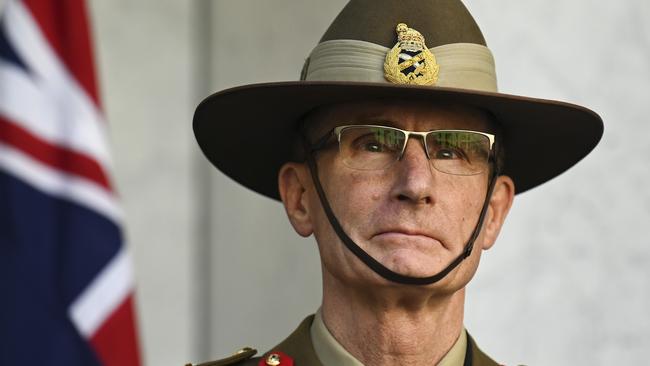Angus Campbell ‘optimistic’ but admits there are ‘some problems’
Defence chief says aberrant behaviour or poor performance at a unit level is the exception, rather than the norm

Defence Force chief General Angus Campbell has defended the military against accusations of cultural problems, in the wake of revelations from the Brereton report into alleged war crimes committed by the Australian forces in Afghanistan and the Ben Roberts-Smith defamation case.
In a roundtable on workplace power hosted by Champions of Change, General Campbell, who has been chief of the Australian Defence Force since July 2018, said there had been a significant change in the culture of the force in recent years, including having an increasing number of women promoted into senior ranks and the recruitment of people from more diverse backgrounds.
He said he was “optimistic” about the future of the organisation, but admitted there had been some behavioural problems whose causes he was analysing.
“The settings in which we have aberrant behaviour or poor performance at a unit level are the exception, rather than the norm across the force,” he said.
“I think that is something which has been well and truly documented historically. But if we don’t have the right leadership, the right training environment and open connections between our organisations, and sensitive open learning organisations, this is where you see, from time to time, behaviour – not at an individual level but more generally across a unit – start to decline.
“In any big and geographically dispersed organisation there are going to be challenges about variations to the core values and behaviours that you would wish to see exemplified everywhere.
“What you see isn’t one problem that reoccurs, but you see factors that can, if in combination exist, can create an environment that deviates from the preferred, the norm and the exemplary environments that you want to see built in your organisation that produce the most effective organisations and the people who are most fulfilled in doing their work.”
He said the Defence Force had changed significantly in recent years and was moving in the right direction.
“What I see at the top (of the Defence Force) is middle class white Australia. Now, middle class white men and women Australia.
“But what I see entering at the bottom, across the entire force, is multicultural Australia – it’s African Australians, European Australians, Asian Australians.
“It is the diversity of that nation which is a multicultural community now coming in and being encouraged and supported, including Indigenous Australians.”
General Campbell said the number of women with a star rank had increased from 13 to 39 over the past eight years.
The former deputy chief of army, Natasha Fox, became the inaugural chief of personnel early this month, earning her the promotion to lieutenant general and making her Australia’s first female three star officer.
But General Campbell admitted cultural change in the organisation, which has military and civilian staff of more than 100,000 people, could be slow.
“Our systems can be slow because they drive from the bottom,” he said.
“But if we’ve got the right open cultures and leadership behaviours, and we’re drawing in the right breadth of our community, I’ve got a lot of optimism for the future of the force.
“We are certainly not the force I joined. And we’re not the force that we were 10 years ago. The direction of travel is in the right place.”
General Campbell said the review by former sex discrimination commissioner Elizabeth Broderick, into cultural settings in the force, which took place from 2011 to 2014, had been very important for the force.
“It was a singularly important inflection point in our professional journey,” he said.
“It is a journey, though, and it continues. It is very much about understanding who we are, what our purpose is and the power relationships between us.”
While not wanting to comment on specific cases, General Campbell said he had been “thinking about” the causes of recent instances of behavioural problems.
“When we have problems in our organisation, is it a lack of diversity in any force or a lack of feedback? “ he said.
“Is it a closed or exclusive environment? Are our training systems outdated?
“Is the leadership, which is meant to be giving direction and drive, holding people to account?
“What is the informal influence at many levels in the organisation?
“Are some of these factors combining together in ways which produce a negative, rather than a positive environment?”
He said the most impressive organisations in the force were those that were “characterised by open behaviours in terms of feedback, diversity consciousness, training and leadership, rather than closed behaviours”.
“Now, we very much from top to bottom and across the breadth of the organisation, want to see the open behaviours.”



